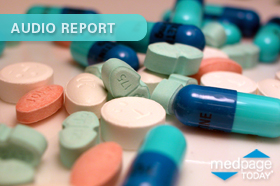|
HOME •
MY MEDPAGE •
CME/CE TRACKER •
MOST POPULAR •
ABOUT US •
|
Personalize Your Medical News: LOG IN | REGISTER | |||
|
||||
|
||||
| Home > Meeting Coverage > APA | |||
|
|||
APA: Drug Interactions a Common Risk for Schizophrenic Patients |
|||||||||||||||
|
|||||||||||||||
WASHINGTON,
May 9 -- One-fifth of patients with schizophrenia receive prescriptions
for drugs that can cause dangerous interactions when taken in
combination, a researcher said here.
Significant adverse effects were rare, but between 18% and 22% of Ohio Medicaid patients under treatment for schizophrenia were given prescriptions for an antipsychotic and one or more other drugs with well-known interaction potential by the same physician or pharmacy, reported Jeff Guo, Ph.D., of the University of Cincinnati. What's more, 11% to 12% of patients received prescriptions for such dangerous drug combinations from the same provider on the same day, Dr. Guo told attendees at the American Psychiatric Association meeting. Action Points
Comorbidities likely to require drug treatment were common, the data showed. Depression, anxiety, diabetes, and hypertension were each diagnosed in more than 10% of patients in the study.
Several comorbidities were significantly more common among patients receiving dangerous drug combinations according to multiple regression analysis. They included depression (P=0.001), substance abuse (P=0.0003), anxiety (P=0.0003), hyperlipidemia (P=0.008) and chronic obstructive pulmonary disease (P=0.028).
Dr. Guo said actual incidents of adverse events stemming from interactions were very uncommon. He and his colleagues identified 109 episodes among the 6,808 patients receiving risky drug combinations, or about 1.7%.
They defined adverse events as those known to have potentially severe or life-threatening consequences, such as extrapyramidal symptoms, increased seizure risk, QT interval prolongation, and arrhythmias.
Among the actual interaction-related adverse events identified in the study, the researchers found the average treatment cost was $10,511 over the 90 days following the episode's onset.
The 90-day cost for other patients -- including those who received risky combinations but did not have adverse effects -- was less than $1,900.
Combinations with major interaction potential were prescribed simultaneously by the same clinician in 18.9% of patients. Pharmacies dispensed such combinations in 22.1% of patients.
In about half of these cases, the combinations were provided by the same clinician or pharmacy on the same day: 11.3% of patients received same-day prescriptions from clinicians and 12.2% had drugs dispensed on the same day from the same pharmacy.
"The take-home message to physicians is that we need to prevent these drug-interaction pairs, we need to educate physicians more," Dr. Guo said.
David Baron, D.O., of Temple University in Philadelphia and program chair of the meeting, agreed that more should be done to prevent drug interactions.
"It's not well taught in medical schools and is so important," he said.
"The essence of this poster ... carries beyond schizophrenia," he added. Dr. Baron argued that every physician who prescribes drugs needs to pay attention to the potential for drug-drug interactions.
He said technologies are now available that flag drug combinations with interaction potential, but they have only just begun to be incorporated into real-world practice.
"We've got a long way to go with that," Dr. Baron said.
|
|||||||||||||||
|
Primary source: American Psychiatric Association, abstract # NR-04 Complete APA Coverage |
|||||||||||||||
|
Earn CME/CE credit for reading medical news |
|||||||||||||||
|
|||||||||||||||
|
Disclaimer |
|||||||||||||||
|
|
|
|
CME Spotlights | See Complete List |
"Add Your Knowledge" is a chance to provide your point of view on the medical science presented in these articles, based on your clinical experience or your interest in the area. Your comments may be edited for space.
Mark Bloom
Editor-in-Chief
Guide to Biostatistics
Important epidemiologic concepts and common biostatistical terms to help clinicians translate medical research into everyday practice.
| Meeting Coverage | News By Specialty | Surveys | Blogs | Multimedia | State CME Requirements | CME Tracker | RSS Feeds | About Medpage Today |
| Editorial Guidelines | Help Center | CME Spotlights | Resources | Registration | Privacy | Site-Map | Technical Requirements | Terms of use | HealthCare Job Board | |
MEDPAGE TODAY, EXPERT PATIENT, MEDPAGE TODAY MOBILE, ADD YOUR KNOWLEDGE, PUTTING BREAKING MEDICAL NEWS INTO PRACTICE and TEACHING BRIEF are registered trademarks of MedPage Today, LLC. |
© 2004-2008 MedPage Today, LLC. All Rights Reserved. |



